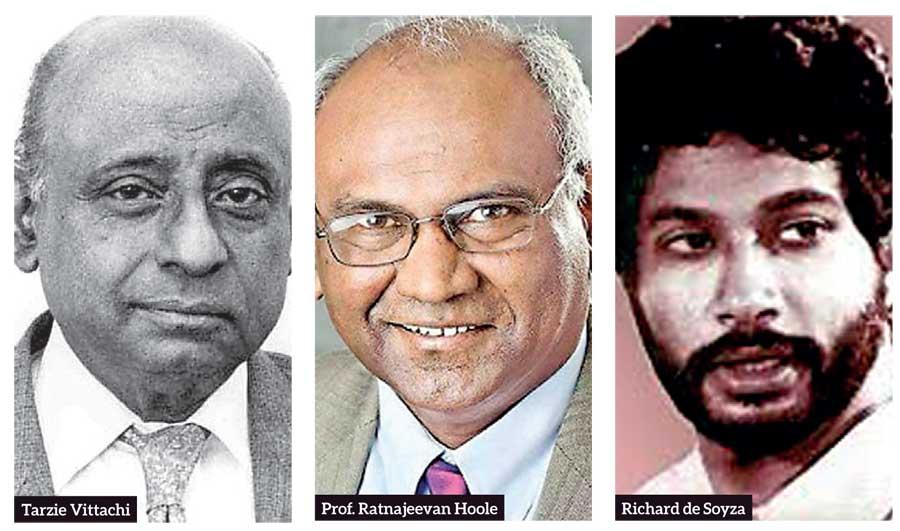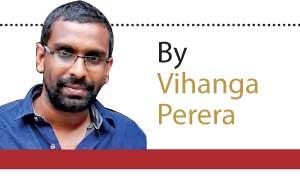15 Jun 2020 - {{hitsCtrl.values.hits}}

"Trends, styles previously prevalent in the “kavi kola” and “kaele patthara” traditions have permeated into and found a safe home in Sri Lanka’s English journalism"
Idolizing the times of pre-nationalization Lake House, it was Richard de Zoysa who wrote a caricature of the late 1970s and early 1980s press. Dedicated to iconic journalist Tarzie Vittachi, the poem was titled “Colombo 1981”. Nostalgic of the past—one of which he himself was student and reader—de Zoysa laments the decay of the finer and subtler art of political criticism: the kind of attack leveled through caricature which Vittachi had mastered in his news columns. As a student of journalism, the writer remembers the late Dalton de Silva speaking of Vittachi’s editorial standards; of the mature line between humour and slander.
news columns. As a student of journalism, the writer remembers the late Dalton de Silva speaking of Vittachi’s editorial standards; of the mature line between humour and slander.
"Commenting on the state’s role in the 1958 Tamil riots, Vittachi wrote Emergency ’58 for which he was awarded the Ramon Magsaysay prize"
Though, by today, de Zoysa, Vittachi, and Dalton de Silva have passed away, it is not too unlikely that Sri Lanka’s editorial desks have not, at some capacity, caught a glimpse of their make and work. I make this connection at a time when the standards of the independent English press—especially, in its front page arrangements catering to mass confusion and rage—are under scrutiny; where, tabloid tactics and cheap renderings of misinformation and disfigurement are conveyed in bold spread. The series of “controversial news” targeting Elections Commission member Prof. Ratnajeevan Hoole is the most recent of such questionable media practices. Hoole’s provoked response against the paper that maliciously mistranslated him to his disadvantage, in itself, was contemptuous and angry. The paper under fire seemed to mimic the approach of certain papers of a Sinhalese nationalist bent. The evident political bone the paper has with Prof. Hoole is played out as an attack on Hoole’s person, and his role as Elections Commission member.
Coming back to Vittachi, legend has it that on the eve of his columns “Bouquets and Brickbats” and “Fly by Night” being printed in a leading newspaper, Colombo high society and the powers that be were in suspense. The sharp criticism Vittachi leveled on the foibles of politicians through his (Ceylonized) Shakespeare renditions make literature of the best quality. Commenting on the state’s role in the 1958 Tamil riots, Vittachi wrote Emergency ’58 for which he was awarded the Ramon Magsaysay prize.
A day at the National Archives is well spent in unraveling recent tabloid-ish tendencies of Sri Lanka’s mainstream news content. The paralysis of sharp and perceptive attacks—of wit, humour, and creative practice—seems to have ushered a culture that depends on sensational headlines, hysteria-inducing words, and word-bombs targeting mass rage. At one point in time, such practices were looked at with disdain by the non-affiliated (to the state) English press who—with one or two exceptions—was generally seen as ethically conscientious, if not moderate and reasonable. Political ideology aside, an English paper rarely banked on “cheap stuff” to undermine the dignity and integrity of a person. With the exception of one hard-hitting paper, the non-affiliated English press rarely tackled above the shoulder. But, this seems to have changed alarmingly in more recent years. Trends and styles previously prevalent in the “kavi kola” and “kaele patthara” traditions have permeated into and found a safe home in Sri Lanka’s English journalism.
"Though, by today, de Zoysa, Vittachi, and Dalton de Silva have passed away, it is not too unlikely that Sri Lanka’s editorial desks have not, at some capacity, caught a glimpse of their make and work"
With its three-member apparatus, the Election Commission, in its present form, is an icon of the Sirisena-Wickremesinghe government’s commitment to transparency and good governance. As a public commission, it is one of the success stories of a government which, after starting with a bang, petered out in a whimper. Even in March 2020, with what seemed like the current government’s haste for elections notwithstanding pandemic concerns, the Commission held its castle without surrendering to political pressure. Contrary to the government position, the stance of the Commission was bold and independent. Of the Commission’s triumvirate, Chairman Mahinda Deshapriya is both a popular public servant and an articulate speaker, while Prof. Hoole, on several occasions, had been outspoken and directed by his conscience. Seen from the outside, the Commission displays the healthy formula of individual autonomy in equilibrium with
collective energy.
"Recent social media shares and insidious remarks indicate that there are bodies who desire to see a breakdown within the Election Commission"
The act of breaking down this fairy tale equilibrium is a political prerogative. Recent social media shares and insidious remarks indicate that there are bodies who desire to see a breakdown within the Election Commission. Since the political destiny of certain parties may be served by such an event, this is quite understandable.
The rapport the commission maintains with diverse stakeholders including the public, the confidence the people have of its performance, and its dignity as a respectable organ of state are paramount to the success of the elections to come. Mature journalism should be able to tow the in-house political ideology without forsaking its duty to society and its own dignity as a news brand. The towing should not disadvantage the individual at a personal capacity and public interest. In an era steeped in disinformation and pieces inducing mass hysteria, the re-visitation of the lengths to which a paper must go in knuckleduster tactics is timely. Media has to turn back on itself and think seriously of a system overhaul. It is now high time.
28 Nov 2024 44 minute ago
28 Nov 2024 3 hours ago
28 Nov 2024 4 hours ago
28 Nov 2024 4 hours ago
28 Nov 2024 5 hours ago